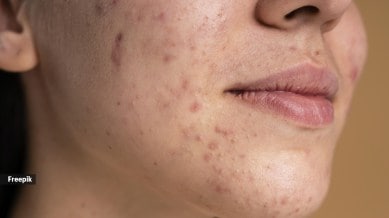📣 For more lifestyle news, click here to join our WhatsApp Channel and also follow us on Instagram
Dermatologist debunks ‘five common myths’ around acne and reveals what really triggers adult breakouts: ‘What you eat is not the cause’
As adult acne becomes more common and myths persist, understanding the real triggers and treatment options is essential.

Acne is often thought of as a teenage problem, but the reality is far more nuanced. Adult acne is increasingly common, and widespread myths around its causes and cures can make managing breakouts confusing. Dr Gurveen Waraich, a certified dermatologist specialising in clinical and cosmetic dermatology and skin care, recently addressed these misconceptions in an Instagram video.
She highlighted the prevalence of adult acne and clarified what actually triggers breakouts. “I am 35 years old. I never had acne in my teen years. Why am I getting it now? What you are suffering from is something called as adult-onset acne, which is actually seen post 25 years of age,” Dr Waraich said, noting that acne is not limited to oily skin types. “In fact, adult-onset acne is seen in equal frequency for both oily and dry skin types,” she explained.
monthly limit of free stories.
with an Express account.
Dr Waraich also addressed diet and makeup-related myths. While some dietary components, such as sugar and dairy, can aggravate acne, they are not the root cause. “What you eat is not the cause of your acne. Yes, it could be an aggravating factor like sugar and dairy, but not causative,” she clarified. Similarly, makeup itself is not a direct cause of breakouts — improper removal can worsen them, but the product alone is not the culprit.
Finally, the dermatologist stressed that acne should not be dismissed as a teenage rite of passage. “No, acne is common in teenagers, not normal. You must treat it to prevent permanent scarring,” she advised.
So, why does adult-onset acne occur, even in people who never had teenage acne?
Dr Swetha Sridhar, assistant professor, Dermatology Department at Bowring Hospitals, tells indianexpress.com, “Adult-onset acne is surprisingly common, especially in women after age 25. Hormonal fluctuations play the biggest role — androgens (male-type hormones present in both sexes) can stimulate oil (sebum) production, clogging pores and feeding acne-causing bacteria. This can happen during the menstrual cycle, pregnancy, post-partum, or perimenopause. Even stress raises cortisol, which indirectly boosts androgen activity.”
Lifestyle factors add fuel. Dr Sridhar notes that high stress, poor sleep, certain medications (like steroids or anticonvulsants), and skincare products that aren’t non-comedogenic can worsen breakouts. Genetics matter too. Someone acne-free as a teen can still develop adult acne if their hormones or environment shift.
How significant is diet and makeup in managing acne?
Dr Sridhar stresses, “Diet doesn’t ’cause’ acne but can exacerbate it. High-glycemic foods (white bread, sugary drinks) and some dairy products may raise insulin-like growth factor-1 (IGF-1), which stimulates sebum production and inflammation. Research in Nutrients (2020) supports this link, though it’s modest.”
Makeup itself isn’t the villain; pore-clogging formulas and poor removal are. Using non-comedogenic, fragrance-free products and double-cleansing before bed can help reduce flare-ups. “Practical steps: manage stress, maintain a balanced diet low in refined carbs, avoid picking at pimples, and stick to a gentle skincare routine with actives like salicylic acid or niacinamide. Consistency, not drastic elimination, works best,” explains Dr Sridhar.
Why is it important to treat teenage acne instead of assuming it’s normal?
Acne may be common in teens, but it’s not harmless. Dr Sridhar informs, “Persistent inflammation damages skin’s collagen and can leave permanent scars and post-inflammatory hyperpigmentation. Untreated acne can also affect self-esteem and mental health.”
Dermatologists now recommend early, tailored treatment — from topical retinoids and benzoyl peroxide to oral medications for moderate to severe cases. In adults, treatments often combine hormonal therapy (like spironolactone), prescription retinoids, and gentle skincare.
DISCLAIMER: This article is based on information from the public domain and/or the experts we spoke to. Always consult your health practitioner before starting any routine.
📣 For more lifestyle news, click here to join our WhatsApp Channel and also follow us on Instagram